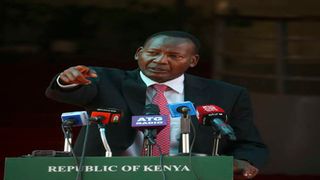
The late Joseph Nkaisserry addressing journalists at Harambee House in Nairobi on November 10, 2015 during his tenure as the Cabinet Secretary for Interior and Coordination of National Government.
|News
Premium
Exclusive: General Joseph Nkaissery and I
What you need to know:
- Joseph Kasaine ole Nkaissery’s life can be summarised in two words: service and sacrifice.
- General’s death threw me into a loss of routine. For instance, I no longer listen to BBC and VOA news over the radio.
I feel like he went away with everybody. Our vision-bearer took with him the vision of how he wanted this family to be; it’s not only him who went.
What is the best way of honouring him and his vision? Whose job is it to keep someone’s memory alive, to safeguard a legacy? Does the one who lived always feel like they owe something to the one who died? Do people know who he really was? What role do I play in ensuring they know who he was?
They say you should live your life as though you are writing your obituary — do only the things you wish to be remembered for. When I think of it that way, I see that Joseph Kasaine ole Nkaissery’s life can be summarised in two words: service and sacrifice.
In 1980, when I got to know him properly, he was a captain in the army, based at Lanet, near Nakuru. I was a student at Kenya Science Teachers College in Nairobi, training to teach Mathematics and Physics.
We were married for 37 years and blessed with four children — Soila, Siopot, Andrew and Ken. We lived in Lanet, Nakuru; Carlisle, Pennsylvania; Nairobi and of course Maparasha, his birthplace, which is about 20 kilometres from Enkorika location, the place where I was born.
Warring clans
Perhaps we were fated to meet. Not just because in the 1970s the two of us were among the few tertiary-educated Maasais from Kajiado, but, ironically, because we hailed from two warring clans.
He came from the Matapato clan that had been at war with my father’s Dalat-le-kutuk clan for decades. My father, Chief Kapei Polong, had tried for many years to bring an end to the bloody cattle raids between these two clans. Often, the raids ended in deaths on both sides.
My announcement that a suitor from Matapato clan would be visiting our home was met with outrage by some of my father’s brothers and cousins. My aunts asked me in fear: “Have you run out of your mind? You go and bring enemies to our home? Who is going to even receive them, people who have killed our people?”
But it was meant to be, because my father supported it. He told the elders who had gathered to listen to this strange news. “If it is my daughter who will bring peace to these clans, so be it,” he said.
During our wedding ceremony at the Nairobi Baptist Church, presided over by the Rev John Tompo ole Mpaayei, the tension between the families was palpable. They stood on either side of the church entrance glaring at one another. I suppose what quelled their battling hearts was the pomp and colour of a military wedding, raised swords and all.
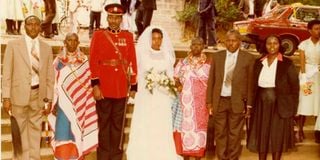
The late Joseph Kasaine ole Nkaissery and his wife Helen on their wedding day at Nairobi Baptist Church in 1980.
I think often about this aspect of our bond, the General and I — the fact that our union became the union of two clans and the end of a protracted clash in our Maasai community.
Whenever I feel overwhelmed by grief, my mind in a turmoil of whys and what ifs, I try to focus on a happy memory. Invariably, I remember an incident when General either said or did something outrageously funny; or something selfless; or something so thoughtful and caring for someone else.
I think my children do this too. One of them will mimic General’s KiMaasai accent and ask tunaenda Maambasa? And we all fall about laughing. At other times one child looks at another and playfully invokes their father’s go-to prescription: Wewe! Unakaa idle. You need to exercise!
Which one of us didn’t hear those words from him a hundred times over? You’d say you have a headache, or your knees are hurting, your back is stiff or some other mild discomfort, and instantly General would say: “Go and exercise.”
I don’t need to wonder whether he would have recommended exercise as a remedy for grief. I know the answer. Twenty-nine years in the army left him with a passion for sports, strategy and order.
He abhorred sloppiness in any form. Untucked shirts and uncombed hair were unthinkable in his presence. One time he found one of our children’s friends in the living room sporting this fashionable matted hair. He thundered: “Young man! You don’t have a comb in your home?” He often carried a comb in the inner pocket of his jacket.
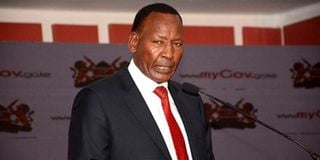
The late Joseph Kasaine ole Nkaissery during his tenure as Cabinet minister. He died on July 8, 2017 of a heart ailment.
Someone recently described General as having “a commanding voice”. It is so true. When he spoke, you almost had to stop what your were doing and listen, perhaps fearful that he would pounce on you as he gestured and jabbed the air with his left hand. Maybe he used to be left-handed before his teachers in lower primary school forced him to write with his right hand. I don’t know. But I do know for sure that beneath his harsh-sounding exterior lay a thoughtful, kind man.
One time, whilst he was Cabinet Secretary in charge of Interior and Coordination of Government, we were driving in an entourage to visit a project in rural Kajiado. I forget the specific details of date and place. We had received news a few days earlier that a family close by had lost their patriarch. As we travelled to the meeting, General looked through the car windows at the scrubland terrain that he was so familiar with and asked me, “Isn’t this close to that home where they are bereaved?”
The County Commissioner quipped: “Sir, unajua hata hapa hakuna kiti ya kuketi”.
General said it didn’t matter. He yelled at the driver, “Ero! Turn, turn in .” I tried to caution him in KiMaasai about descending on that poor family unannounced saying he would stress them with seating arrangements. He was unfazed. The ministerial motorcade breezed past the dry scrubland and into the manyatta, where a startled family gathered quickly to receive us.
He said to the men of the boma, “I hear you don’t have a seat in this home!?”
One man fumbled, “No, Baba tuko na kale...”
“That three-legged stool is the one I want. Twende tukae kwa ule mti. Bring it. Ita hawa watoto wote. And we only have 10 minutes kwa ajili hawa wakubwa labda wako na haraka”, he said gesturing at the county commissioner, the bodyguards and I.
Then the oldest man said, “Na Baba huwezi kuja na ukose kunywa chai.”
He was never much of a tea person, one cup at dawn was his fill. But now he said, “Iko? Leta, na ulete kikombe mimi nijiwekee.”
“Hiyo sasa ni ukora ya kijeshi”, I whispered to him as he poured a little for himself while shouting, “Muwekee Mama Soila na umujazie yeye. She loves tea!”
That was him. Such delightful mischief within the family. He would even play hide and seek with our granddaughter, Yiantet, hiding his lanky frame behind the curtains. Nowadays, this ten-year old child cautions us not to do anything wrong saying, “Nkakuyia (grandfather) is watching us.”
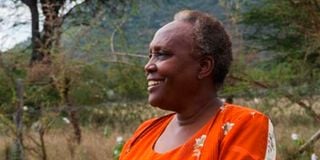
Mrs Helen Nkaissery at Entorika, Kajiado, in June 2021.
Their powerful bond reminds me that General never allowed power to consume him. He never allowed the positions he held to restrain him from mingling with people.
A full-blooded Maasai, he knew the culture well, but he was never afraid to challenge retrogressive practices. We had many discussions about early marriage and female genital mutilation (FGM), which, he argued, were designed to oppress young girls and women. His Christian faith, and values propagated through the AIC and Nairobi Baptist churches, were unshakeable and he even used them to challenge the laibon notion that had emerged among our people during colonialism and the subsequent practice of morans giving animal gifts to the laibons in pursuit of power over other age sets.
General’s entry into politics in 2002 saw the two of us grow into a tight team, sharing the work of campaigning and brainstorming ideas for the transformation of the lives of his constituents.
When I initiated the Maasai Women’s Dairy Cooperative, he gave it his full support, using the Constituency Development Fund (CDF) to get land and to build eight milk collection centres in Kajiado Central.
The 13 years he served as an MP were intense, but they were very fulfilling.
General’s strong friendship with President Uhuru Kenyatta, which started way before their entry into politics, was the reason my husband agreed to leave his role as MP and join government.
In his new role at the Office of the President, he contributed so much to securing the country.
But oh! His term in Cabinet disrupted our lives. We were never prepared for that. We had to convert a place in Bissil for the security detail. Our lives changed so much, nothing was really normal.
So, people who long for extreme things, there is a cost in it. Normality has value.
Women’s empowerment
General’s death threw me into a loss of routine. For instance, I no longer listen to BBC and VOA news over the radio, something that General did unfailingly, every day, throughout the day. In the car the radio was always on. In the house he carried his portable radio all over, even to the shower! Now I can’t bear to switch it on.
Fear grips me sometimes. I pray and tell God I don’t want a feeling of bitterness to remain with me. I get strength from ordinary folk who come and share with me their fond memories of General.
Last December the community poured into our home to celebrate our son Ken’s wedding to Wangechi; delighted to meet with us after the long year of Covid-19 restrictions and check how we were coping.
I also get calls from our President, Cabinet colleagues through Dr Fred Matiang’i, General’s colleagues in the Kenyan military and across the world, including a few from his old classmates at the US Army War College in Pennsylvania where he studied for a year and gave insightful solutions to resolving conflicts and addressing issues of small arms in the East African region.
Though General’s absence overwhelms us, my children and I do not despair. My faith, the church and my children have been the strongest pillar of hope.
My other anchor is the ranch in Bissil where we have successfully conquered the ipomoea weed with persistent policing and uprooting. I find purpose and inspiration here — “feeling the cows” as we say it in KiMaasai; securing pasture for the cattle; tracking the harvests from the beehives; the butchery; and meeting the women from the dairy cooperative. They always remind me how supportive he was of women’s empowerment.
I used the structures we established in the cooperative as the building blocks for Ushanga Kenya Initiative, where I serve as chairperson.
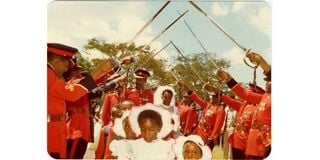
The late Joseph Kasaine ole Nkaissery and his wife Helen on their wedding day at Nairobi Baptist Church in 1980.
Following General’s death, President Kenyatta appointed me to head this enterprise for pastoralist women from seven counties so that his government can bring value addition and markets to the women’s skill of making ornamental beads. Currently, we are designing a bracelet that the United Nations Population Fund (UNFPA) will use for its anti-FGM campaigns worldwide.
My other anchor is The General Joseph Nkaissery Family Foundation, which was started in 2016. Through it, the children and I continue to offer bursaries, equip secondary and primary school classrooms, labs and dormitories. We do this to carry on General’s values of service and sacrifice; his vision of a united Kenya where girls have access to education and men can get jobs and build livelihoods.
We hope that through these schools, his examples of humility, orderliness, innovation, honest straight-talk, courage, excellence in sports, working-life and especially community service of the kind that he started doing as a young army recruit will grow for the betterment of our country.
As for the day he left us – the day when our people say the sky darkened and a dust storm blew over Bissil for ten days to signal Kiminie olakira loormasae, our star has gone – I can’t tell that story today. And with this unending scourge of the novel coronavirus, we dare not assemble to tell stories of General and what he meant to us.
Remembering General
Nonetheless at home this week, and especially on Wednesday July 8, we will remember General with abundance and with love. It is said that grief is love that has nowhere to go. On Wednesday, our love will be poured into General’s favourite songs of our youth by Hank Williams, Dolly Parton, Abba and Kenny Rogers.
As we grew older we sung from the AIC Kiswahili and Maasai hymn books. We would end the evening without finishing a single song because we got busy arguing, each accusing the other of being out of tune. These singing sessions were my way of getting him to relax, since he was always working with his four phones near him.
Here was a man who understood his purpose and undertook his assignments with humility; with a clear strategy, with compassion and with zeal. He was a man who wrote his own story indelibly. And it’s a story that we, the nuclear and larger Nkaissery family, will never forget.
As told to Dr Joyce Nyairo.




